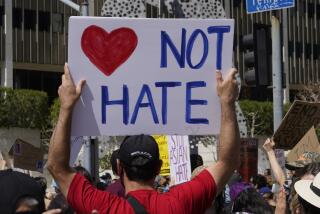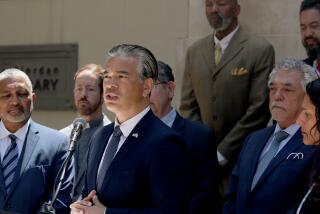Online Hate Sites Surging, Report Says
- Share via
They can be as inflammatory as an online video game whose objective is to lynch a black man or as seemingly innocuous as an information site on the Holocaust by a so-called historical society.
But these sites on the World Wide Web all propagate hate and are increasingly targeting children, according to a report released Tuesday by the Simon Wiesenthal Center.
The CD-ROM report, titled “Digital Hate 2000,” is an update to the center’s first report on the subject of Internet hate sites, released in December 1997.
“We have found this increasing, literal explosion of the migration of hate groups across America to the World Wide Web,” said Rabbi Abraham Cooper, associate dean of the center, speaking at a news conference at the Museum of Tolerance in Los Angeles.
He called for greater oversight by parents and educators, and urged Internet service providers to refuse to host individuals and groups spreading hate and misinformation. Generally, the 1st Amendment protects such Web sites.
On April 19, 1995, the day of the Oklahoma City bombing, there was only one known Web site--established by the Ku Klux Klan--promoting such views, Cooper said. When the center’s first report came out, a little more than a year ago, there were about 600 Web sites that espoused racial violence, anti-Semitism or homophobia.
The new report now documents more than 1,400 hate sites. Since the compilation was completed three weeks ago, 120 more have appeared, said Michele Alkin, a spokeswoman for the center.
In contrast to hate sites of the past, Web pages today are more sophisticated, Cooper said. Many invite children to explore and play--such as an online crossword puzzle promoting white supremacy or video games with racist themes.
Others disguise themselves as information sites--such as the one that denigrates civil rights leader Martin Luther King Jr. or others asserting that there is no evidence the Nazis systematically killed Jews during World War II.
The Wiesenthal Center will distribute thousands of free copies of the report in coming weeks to educators and police agencies. Others may buy the CD-ROM for $20.
The report was hailed by local civil rights leaders.
“We applaud the fact that the Wiesenthal Center has not endorsed censorship,” said Stephen Rohde, president of the American Civil Liberties Union of Southern California. “It’s the responsibility of all publishers and providers to choose speech and advertising that are consistent with their policies.”
Geraldine Washington, president of the Los Angeles chapter of the National Assn. for the Advancement of Colored People, said: “Hopefully this report will remind us and motivate us to take some type of action. This really is a wake-up call that parents, educators, law enforcement and the business community need to get involved.”
More to Read
Sign up for Essential California
The most important California stories and recommendations in your inbox every morning.
You may occasionally receive promotional content from the Los Angeles Times.










